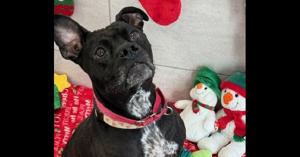
But while the festivities bring cheer to our homes, they can also pose unexpected hazards for our furry companions. To ensure that your holiday season remains merry and bright, here are some important tips to keep your pets safe and sound. While festive decorations add a touch of magic to our homes, they can also become irresistible playthings for curious pets.
Garlands, tinsel and ornaments, if within reach, can be tempting targets for chewing or batting, potentially leading to ingestion or entanglement. To avoid such mishaps, keep decorations out of paws' reach, especially items that are small or easily breakable. Candles, while adding a warm glow to the ambience, can also pose a fire hazard.

Place them securely on high surfaces away from wagging tails or prying paws. Electrical cords and wires, often dangling from decorations or electronics, can also be a source of danger. Keep them tucked away or secured with cord covers to prevent inquisitive nibbles.
As for presents, the frenzy of unwrapping can be overwhelming for pets. Consider confining them to a separate room during gift opening to avoid accidental injuries or distress. Baby gates or dog crates can be helpful for smaller pets, while a closed bedroom can provide a quiet retreat for cats.
The abundance of holiday treats can be a temptation for pets, but many common festive foods are toxic to our furry friends. Onions, for instance, can lead to anemia in dogs and cats. Raisins, chocolate and alcoholic beverages are also on the "no" list, as they can cause severe health problems.
Rich, fatty foods such as gravy should be avoided, as they can trigger pancreatitis, a painful condition requiring veterinary attention. Additionally, baking string, plastic wrap and aluminum foil can cause digestive blockages, while chicken and turkey bones pose a choking hazard. To prevent accidental poisoning keep pets out of the kitchen during food preparation, away from the dining table and out of reach of the garbage.
Consider using pet-proof trash cans with secure lids to prevent scavenging. Also keep seasonal flowers out of reach for pets. Lilies are highly toxic to cats, and amaryllis, yew, holly, poinsettias and mistletoe should also be kept away from animals.
Christmas tree water can contain bacteria, pesticides and mold, so be sure to prevent access. The holidays can feel hectic and pets can still feel stressed by the changes in routine and the novelty of decorations and lights. This stress can manifest in various ways, such as excessive barking/meowing, hiding or changes in appetite.
To help your pets cope with the holiday hustle and bustle you might want to provide them a safe space, such as a quiet room or a comfortable crate, where they can retreat when feeling overwhelmed. Familiar toys and bedding can also offer comfort and a sense of security. Microchipping and ID tags are crucial for pets, especially during the holidays when open doors and increased activity can lead to accidental escapes.
Ensure that your pet's microchip information is up-to-date and that their ID tags include your contact information. Remember that our pets are attuned to our moods and even subtle changes in the environment. Show them extra love and reassurance during this time, as they too could benefit from a little extra TLC.
After all, the holidays are a time for sharing joy and creating memories, and our furry companions deserve to be a part of that heartwarming experience..













